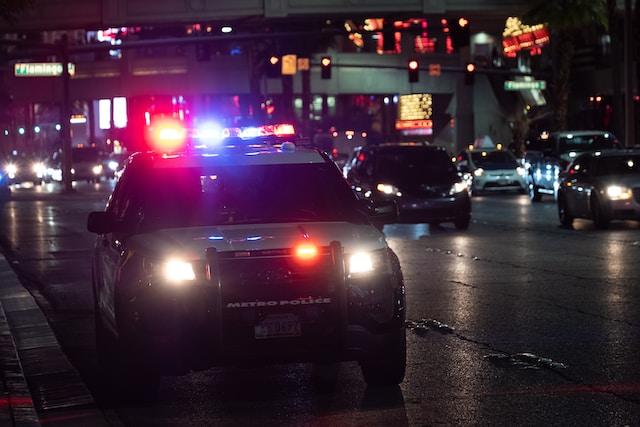What Is A Police Citation?
Our product recommendations are made independently, but we may earn affiliate commissions if you use a link on this page.
If you’re pulled over while driving, one of the most common items police will hand you is a citation. It’s helpful for you, behind the wheel, to know what you could face on the road if you are ever pulled over by an officer.
A citation is essentially a form of a traffic ticket, a document proving an individual has been notified they committed a serious motor vehicle violation by someone of official legal standing. It’s critical for someone who receives a citation to respond.
If you’re curious about a police citation and what it means for your future, read on. As someone who drives behind the wheel of a car, it’s helpful to know what you will face if you’re ever in a situation where you’ve committed a serious traffic violation.

What Is A Police Citation?
A police citation is a directive given by a person of the law or another person legally authorized through a statute. It demands that the person who receives the paper should come to court and respond to the misdemeanor or charges given for their actions. This paper proves the individual has violated a critical law on the road.
A citation is essentially a written notice that you have crossed the line and broken the law. It states you need to face the legal consequences for what you have done, whether that includes a fine or points for your endeavor. Respond appropriately to the citation to avoid more detrimental punishments for your actions behind the wheel.
Types Of Citations
Citations are an overarching term, though each citation can cover a different crime on the move. There are three types of citations, each determining the severity of the crime and how much you owe for committing it.
There are three types of citations:
- Penalty vs. warning: Some locations require an officer to produce a punishment for the individual violating the rule, while others may simply offer a warning if the issue isn’t too serious.
- Moving vs. nonmoving: Nonmoving violations include items where nothing was in motion, such as a parking trouble. Moving means speeding or other violations where the car is in motion.
- Criminal vs. non-criminal: Most traffic violations are non-criminal. Criminal citations include violating rules by driving recklessly, getting behind the wheel under the influence, driving without insurance, and other serious infractions.
These classifications might determine the punishment received.
Some citations might be for noncriminal, nonmoving violations and the user can come off with a warning. In other cases, the citation might be for a criminal moving act, in which the driver will face more serious fines and even jail time in some situations.
Do You Have To Go To Court For A Citation?
Most of the time, you have two options when receiving a citation. You can pay the fine posted on the paper, or show up in court to prove your innocence or attempt to lower the punishment. Most people head to court to avoid getting points on their license once everything is settled.
If you’re required to go to court, it’s critical to head to your local authority and face the judge on your assigned court date. If you avoid facing the consequences of your actions, there could be a warrant put out for your arrest.
Sometimes, you might get off with nothing more than a warning. However, most citations require a visit to the court or a fine paid by the person who receives the paper from the officer.
Is Citation The Same As A Ticket?
Although they sound like different things, a citation and a ticket are the same. Essentially, a ticket is a less formal name for a citation. They are both pieces of paper or official documents that inform a driver when they’ve broken the law on the road, what fine they are given, and when they need to appear in court.
Typically, a citation or a ticket is given to a driver by a police officer. They keep an eye out for items like speeding, running a red light, stop signs, parking tickets, driving under the influence, failure to signal, and more. Often, a camera keeps an eye on cars and will inform an officer when a speeding ticket, or citation, is necessary.
If you’re given a citation, it’s a speeding ticket. The words are interchangeable, and both are used by officers.
Citations Versus Warnings
Citations and tickets might be the same thing, but there is a difference between a citation and a warning. One informs a driver they broke the law on the road and is intended to dole out punishment, while the other lets the driver know they broke the law but lets them off with nothing more than a warning for their actions.
Warnings are much less formal than citations. A written version might look like a traditional citation, but it will indicate that it is a warning at the top of the paper. Typically, warnings are only given out for drivers who speed if they are caught going less than 6 MPH over the speed limit by a camera.

Do Citations Have To Be Signed?
Although many are unaware of the requirements, a citation does need to be signed by you and the police officer handing you the document. By signing your name, you’re acknowledging you have seen the claim, not admitting to guilt. It’s a way to prove the officer gave you the warning and that you understand what you face in court.
However, if you choose not to sign the paper, the officer may place you under arrest right then and there. From that point, they can take you to sit in jail and even push you to the court to post bail. Sign your citation when asked to avoid digging yourself into deeper trouble with the law.
What Should I Do If I Get A Police Citation?
It might feel overwhelming to get a police citation. After all, it means you’ve broken the law and received an official warning for your actions. It might seem natural to argue or speak out and defend yourself to the officer, but this action is wrong. Take a deep breath and proceed slowly to give yourself a chance at success.
If you get a police citation, you should complete the following actions:
- Listen to all the information the officer reads
- Sign the citation
- Pay the fine if that’s the route you want to take, usually listed on the citation
- OR, head to court to defend yourself
These steps will help you push past your citation.
Whether you are innocent or guilty of what the citation says, it’s critical to either pay the fine or defend yourself on the court date specified on paper. If you don’t, you may face further punishment and even time in prison for avoiding the repercussions of your actions.
Will A Citation Go On Your Record?
Chances are high that a citation will go on your record. The more significant the crime leading to the ticket, the more likely you will earn marks. Paying the fine in full will not remove the marks. In most cases, the only way to lower the impact of a citation on your record is to attend your court date and make your best case in front of a judge.
Some judges are willing to remove the citation if you prove yourself innocent, or they will lower the punishment if they determine showing up is enough to prove you care about your future on the road. However, not all judges will be this kind. Ensure you don’t try to plead innocent if you are guilty, or additional troubles could arise.

Does A Citation Stay On Your Record Forever?
A citation will not remain on your record forever unless something terrible happens during your time on the road. If you earn points on your license, most states will not make the addition permanent. Many require the points to remain on your record for at least three years before they go away, and you can seek lower insurance once again.
Many states also have laws that require removing your license if you get a certain number of points within a year. For example, those who earn twelve points in three years in North Carolina will get their license suspended.
It’s critical to research the rules in your state before determining if you could pay the fine and take the points or fight the citation on your court date. The choice could determine the future of your license.
How Long Do You Have To Pay A Citation?
You can’t wait too long to pay your citation. Once your court date passes, you typically have about twenty days to pay off your fine before the court reports the absence to the DMV. Some states allow more time, while others offer less to those who have received a citation on the road. It all depends on the state, county, officer, and judge involved with your case.
Sometimes, you might head to court to fight your citation and receive a sentence for a raised or lowered fine. In this case, the judge will provide a day you need to pay the fine, and once that date passes, you might be subject to a suspension of your license or other punishments from the court of law.
What Happens When You Get A Citation For Speeding?
If you are pulled over and receive a citation for speeding, it means you were moving faster than the posted limit for the road. There are varying degrees of seriousness, from less than five miles per hour to more than twenty or thirty. Typically, this ticket will bring you a fine you might want to may off.
Although the punishments aren’t always as somber as speeding, they will impact your insurance rates. Those guilty of speeding may have to handle higher rates and a long-lasting mark on their record from recklessness. How fast you were traveling will impact the punishment for the crime, and what you do to work through the punishment matters.
Do You Need High-Risk Auto Insurance After A Citation?
When you receive a police citation on the go, particularly in the speeding department, your insurance company will see you as a higher risk than before you were given the warning. If you are found guilty of the crime, you will likely face a request to purchase high-risk auto insurance for your vehicle.
Insurance companies don’t want to take chances on those they ensure. High-risk auto insurance is not uncommon after a citation and exists to defend you as a risky driver and the company from your driving habits.
Reference Legal Explanations
If you use any of the definitions, information, or data presented on Legal Explanations, please copy the link or reference below to properly credit us as the reference source. Thank you!
-
<a href="https://legal-explanations.com/blog/what-is-a-police-citation/">What Is A Police Citation?</a>
-
"What Is A Police Citation?". Legal Explanations. Accessed on October 28, 2024. https://legal-explanations.com/blog/what-is-a-police-citation/.
-
"What Is A Police Citation?". Legal Explanations, https://legal-explanations.com/blog/what-is-a-police-citation/. Accessed 28 October, 2024
-
What Is A Police Citation?. Legal Explanations. Retrieved from https://legal-explanations.com/blog/what-is-a-police-citation/.